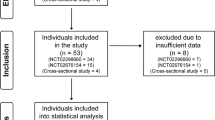Abstract
Introduction
Spinal cord injury (SCI) disrupts autonomic control of the cardiovascular system, which may lead to autonomic dysfunction. Growing amounts of evidence support the possibility that systemic and cerebral hemodynamic dysfunctions may contribute to cognitive deficits in patients with SCI.
Case presentation
We present a case of autonomic cardiovascular dysfunction in a 55-year old female patient following non-traumatic cervical SCI. This case illustrates how a simple arithmetic test may elicit fluctuations in blood pressure causing cognitive disturbances.
Discussion
Clinical awareness of autonomic dysfunction and cognitive deficits is relevant in neurorehabilitation of patients with SCI. Assessment of autonomic function should be evaluated according to recommendation from International Standards to document remaining Autonomic Function after Spinal Cord Injury (ISAFSCI) [1].
Similar content being viewed by others
Introduction
Emerging evidence support the possibility that systemic and cerebral hemodynamic changes contribute to cognitive dysfunction in patients with spinal cord injury (SCI) [2]. This case report presents a patient with autonomic cardiovascular dysfunction and focuses on raising clinical awareness of cognitive deficits due to autonomic dysfunction following SCI.
The material published in this case report is of original research, has not previously been published elsewhere and has not been submitted for publication elsewhere while under consideration.
Spinal cord injury (SCI) disrupts the autonomic nervous system’s control of the cardiovascular system [3]. Spinal lesions may impair spinal sympathetic neurons from supraspinal modulation leading to cardiovascular dysfunctions. These may include bradycardia, fluctuations in blood pressure (BP), hypotension and/or episodes with autonomic dysreflexia (AD) [4, 5].
Growing amounts of evidence support the possibility that dysfunction of the autonomic cardiovascular control after SCI is contributing to cognitive deficits including memory deficits, reduced attention and processing speed. Autonomic dysfunction may be a contributing factor to cognitive decline [2, 6,7,8].
This case report illustrates how a simple arithmetic task may induce variability in BP in a patient with SCI. It highlights the effect cardiovascular autonomic dysfunction may have on driving ability.
Case presentation
A 55-year old woman presented with a non-specific inflammatory lesion in the cervical medulla causing an incomplete tetraplegia, neurological level C2, AIS C. The patient was admitted to our Centre 5 months after onset of symptoms. The patient had no prior history of traumatic brain injury (TBI), and had worked as a teacher in mathematics in secondary school prior to her illness. During the admission, the patient displayed frequent symptoms of hypotension with recurrent dizziness, pre-syncope and fatigue on a daily basis. Due to persisting cardiovascular symptoms, the patient underwent autonomic function test measuring beat-to-beat BP and heart rate (Finometer®MIDI, model 2, Amsterdam ZO, The Netherlands) during which a simple mental arithmetic test was performed (400 take away seven). The test was performed 15 months after onset of non-traumatic SCI. The patient was on Azathioprin 175 mg once a day, Pregabalin 150 mg twice a day, Melatonine 3 mg once a night, Dulcolax 10 mg once a day, Magnesia 500 mg twice a day, Prednisolon 2.5 mg daily, Paracetamol 1000 mg once a day, Calcium and D3 vitamin at the time of testing.
Results
The patient emptied bladder and bowel before testing, and was seated comfortably in an electrical wheelchair during testing. Blood pressure (BP) and heart rate were recorded continuously for 5 min and during the arithmetic test lasting for 120 s. Baseline values showed considerable fluctuations in systolic blood pressure (SBP), diastolic blood pressure (DBP) and mean artery pressure (MAP). MAP was 69 mmHg, mean SBP 94 mmHg, mean DBP 51 mmHg and mean heart rate 84 bpm before testing. The patient did not report any symptoms of dizziness, pre-syncope or discomfort before testing. During the arithmetic test mean MAP was 64 mmHg, mean SBP 85 mmHg, mean DBP 47 mmHg and mean heart rate 88 bpm (Fig. 1).
Figure 1shows systolic blood pressure (SBP), diastolic blood pressure (DBP) and heart rate (beats per minute, bpm) during simple arithmetic test. After 29 s of the mental arithmetic test, SBP dropped from 94 to 79 mmHg with no tachycardia response. The patient reported symptoms of presyncope, dizziness and fatigue in parallel to the drop in SBP and failed to complete the arithmetic test.
Beat-to-beat registration showed a drop in SBP from 94 to 79 mmHg after 29 s of arithmetic testing. DBP dropped from 51 to 44 mmHg. MAP decreased from 68 to 59 mmHg. The heart rate varied between 88 and 94 bpm with no clear compensatory heart rate increase in response to the marked drop in SBP. During the mental arithmetic test, the patient reported symptoms of presyncope, dizziness and fatigue in parallel to the drop in SBP. The patient gave correct answers initially to the arithmetic test, but her concentration and response rate declined quickly and numbers of incorrect answers increased.
The patient was given compression stockings and abdominal binder to increase the BP. This did not sufficiently reduce her hypotensive symptoms. Therefore a trial with Midodrine was performed. The patient had a 24 h ambulatory blood pressure monitoring (ABPM) while off and on Midodrine 10 mg twice a day, 18 months after onset of non-traumatic SCI. ABPM without Midodrine showed a mean BP of 106/66 mmHg during day time, mean BP of 102/62 mmHg during night time. Mean heart was 81 bpm and 83 bpm during day and night time, respectively. ABPM on Midodrine showed a mean BP of 113/71 mmHg at day time, mean BP of 101/62 mmHg at night time. Mean heart rate was 75 pbm and 80 bp during day and night time, respectively.
Discussion
This case shows how an arithmetic test may trigger autonomic dysfunction with a drop in BP in a patient with a high cervical medullary lesion.
Autonomic cardiovascular dysfunction is a common complication to SCI above TH6, more frequent in patients with cervical injury [4, 9, 10].
Although concomitant TBI, somatic and psychological comorbid conditions are recognised as major contributing factors in cognitive deficits in patients with SCI [11], mounting evidence support that hemodynamic dysfunctions following SCI contribute to cognitive deficits [2, 6, 7]. The patient did not have TBI or any other identifiable conditions which could explain cognitive dysfunction. The patient suffered from variable BP due to cardiovascular autonomic dysfunction.
Presently, there is no standardised bedside test assessing cognitive function affected by fluctuations in BP due to cardiovascular autonomic dysfunction. Wecht et al. 2018 found that change in SBP and change in diastolic cerebral blood flow velocity contributed significantly to test performance when assessing information processing speed, sustained attention and visual working memory in patients with SCI compared to matched non-SCI controls [2]. Although this presented arithmetic test (400 take away seven) is not a validated tool for thorough cognitive assessment, it is a possible crude bedside measure of cognitive function. It is simple, quick and accessible, and simulates an everyday task and may be a clinically relevant test. Unfortunately, validated cognitive testing was not performed prior to the arithmetic test, which would have been optimal. The patient’s baseline values of the beat-to-beat registration showed considerable fluctuations in SBP, DBP and MAP, demonstrating dysfunction of the cardiovascular autonomic system. Yet the patient did not experience any symptoms of hypotension during the pretesting period. The SBP, DBP and MAP were consistently lower during the arithmetic test compared to baseline values, and with only a slight increase in mean heart rate from 84 bpm to 88 bpm. Our patient experienced a fall in BP accompanied by reduced cognitive function. This is suggestive of a dysfunction of the cerebrovascular reserve and may partially explain the cognitive deficits observed. Phillips A. et al. 2014 found impaired neurovascular coupling of the posterior cerebral artery in patients with SCI compared to healthy individuals and showed that increasing BP with Midodrine improved cognitive performance of verbal fluency [12].
Treatment with Midodrine 10 mg twice a day raised mean BP from 106/66 to 113/71 mmHg at day time, as shown in the 24 h ABPM, however it did not relieve the patient from symptoms of hypotension. The results from the test and continuous symptoms of hypotension despite appropriate treatment were discussed with the patient. As her personal assistant could drive her car, the patient chose not to renew her driving licence. Clinical awareness of autonomic dysfunction and cognitive deficits is relevant in neurorehabilitation of patients with SCI. Assessment of autonomic function should be evaluated according to recommendation from ISAFSCI [1]. Cognitive function is important for independence including driver license. Mental arithmetic test may be a useful screening tool of cognitive function. Treatment of cardiovascular autonomic dysfunction using non-pharmacological and pharmacological measurements in patients with SCI is important to reduce symptoms and improve independence.
References
Wecht JM, Krassioukov AV, Alexander M, Handrakis JP, McKenna SL, Kennelly M, et al. International Standards to document Autonomic Function following SCI (ISAFSCI): second edition. Top Spinal Cord Inj Rehabil. 2021;27:23–49.
Wecht JM, Weir JP, Katzelnick CG, Wylie G, Eraifej M, Nguyen N, et al. Systemic and Cerebral Hemodynamic Contribution to Cognitive Performance in Spinal Cord Injury. J Neurotrauma. 2018;35:2957–64.
Krassioukov A, Biering-Sorensen F, Donovan W, Kennelly M, Kirshblum S, Krogh K, et al. International standards to document remaining autonomic function after spinal cord injury. J Spinal Cord Med. 2012;35:201–10.
Claydon VE, Steeves JD, Krassioukov A. Orthostatic hypotension following spinal cord injury: understanding clinical pathophysiology. Spinal Cord. 2006;44:341–51.
Eldahan KC, Rabchevsky AG. Autonomic dysreflexia after spinal cord injury: systemic pathophysiology and methods of management. Auton Neurosci. 2018;209:59–70.
Jegede AB, Rosado-Rivera D, Bauman WA, Cardozo CP, Sano M, Moyer JM, et al. Cognitive performance in hypotensive persons with spinal cord injury. Clin Auton Res. 2010;20:3–9.
Nightingale TE, Zheng MMZ, Sachdeva R, Phillips AA, Krassioukov AV. Diverse cognitive impairment after spinal cord injury is associated with orthostatic hypotension symptom burden. Physiol Behav. 2020;213:112742.
Wecht JM, Bauman WA. Decentralized cardiovascular autonomic control and cognitive deficits in persons with spinal cord injury. J Spinal Cord Med. 2013;36:74–81.
Claydon VE, Krassioukov AV. Orthostatic hypotension and autonomic pathways after spinal cord injury. J Neurotrauma. 2006;23:1713–25.
Sahota IS, Ravensbergen HR, McGrath MS, Claydon VE. Cerebrovascular responses to orthostatic stress after spinal cord injury. J Neurotrauma. 2012;29:2446–56.
Sachdeva R, Gao F, Chan CCH, Krassioukov AV. Cognitive function after spinal cord injury: a systematic review. Neurology 2018;91:611–21.
Phillips AA, Warburton DE, Ainslie PN, Krassioukov AV. Regional neurovascular coupling and cognitive performance in those with low blood pressure secondary to high-level spinal cord injury: improved by alpha-1 agonist midodrine hydrochloride. J Cereb Blood Flow Metab. 2014;34:794–801.
Author information
Authors and Affiliations
Contributions
All authors contributed equally and substantially to this case report.
Corresponding author
Ethics declarations
Competing interests
The authors declare no competing interests.
Additional information
Publisher’s note Springer Nature remains neutral with regard to jurisdictional claims in published maps and institutional affiliations.
Rights and permissions
About this article
Cite this article
Kjaerup, D.H., Hagen, E.M., Vibjerg, J. et al. Autonomic cardiovascular dysfunction during simple arithmetic test in a patient with cervical spinal cord injury—a case report. Spinal Cord Ser Cases 7, 78 (2021). https://doi.org/10.1038/s41394-021-00439-w
Received:
Revised:
Accepted:
Published:
DOI: https://doi.org/10.1038/s41394-021-00439-w




